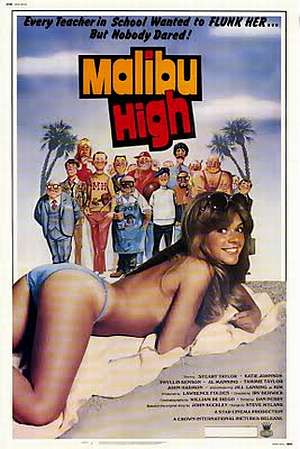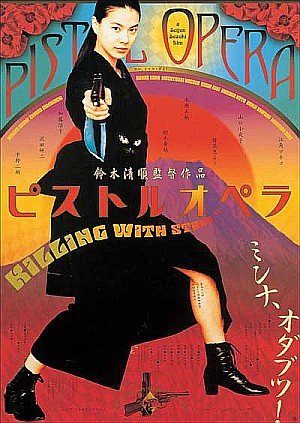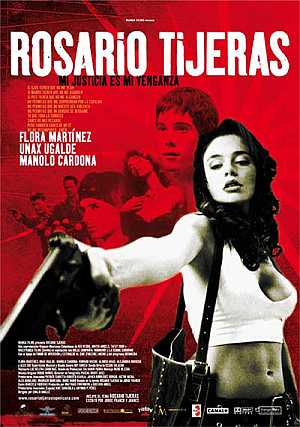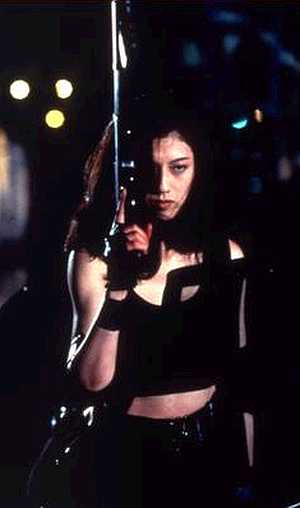★★★½
“A star is born? Well, at least a potential one.”
 After making an undeniable impact strapped to a car bonnet in the second-half of Grindhouse, Zo…Hang on, let me find the right key on the keyboard… Ah, there we are… Zoë gets to do some actual ‘acting’, rather than playing a stuntwoman called Zoë Bell [Way to go, Tarantino!] Thios started as a web-based series of ten episodes, but is now available on DVD, which is how we watched it. Bell plays Eve, an assassin whose personality radically changes after she is stabbed in the head. She starts to see one of her victims – a young girl – and as a result, decides to go after those who ordered the death. Needless to say, her manager and handler Graham (Poth) is not impressed by this sudden burst of morality, and neither are those who have now become her target, including up-and-coming gangster boss Jake Abel, who sends his minions out to take care of her before she takes care of him.
After making an undeniable impact strapped to a car bonnet in the second-half of Grindhouse, Zo…Hang on, let me find the right key on the keyboard… Ah, there we are… Zoë gets to do some actual ‘acting’, rather than playing a stuntwoman called Zoë Bell [Way to go, Tarantino!] Thios started as a web-based series of ten episodes, but is now available on DVD, which is how we watched it. Bell plays Eve, an assassin whose personality radically changes after she is stabbed in the head. She starts to see one of her victims – a young girl – and as a result, decides to go after those who ordered the death. Needless to say, her manager and handler Graham (Poth) is not impressed by this sudden burst of morality, and neither are those who have now become her target, including up-and-coming gangster boss Jake Abel, who sends his minions out to take care of her before she takes care of him.
As an action actress, Bell is unquestionably better at the “action” part than the acting. Not that she sucks at the latter, but one senses she needs more experience with regard to the thespian side of things. This is her first time having to carry a film while playing a character, and thst sometimes is obvious – it’s particularly interesting to contrast Bell and Lucy Lawless, who turns up in a supporting role as Eve’s next-door neighbour. The script also fails to make a convincing case why she makes the switch – maybe it’s the head-injury, but that’s a bit too deus ex machina to work well, and as this barely runs 70 mins, it’s not exactly something they needed to cut out.
Still, this is all redeemed by some excellent action, with Bell (obviously) doing all her own work. She has a short, compact fighting style that looks great on the camera, and there’s a real sense of hardcore energy to it, that makes them fun to watch. Having seen her start off by getting stabbed in the skull, and literally walking away, establishes Eve nicely as an unstoppable force, who can take a licking and keep on ticking. Wisely, Etheredge appreciates that without a stunt-double, there’s no need for quick cutting, and gives the viewer a chance to appreciate her skills. The result is an entertaining B-movie that will hopefully lead to bigger and better things for Bell, who might just become a genuine star down the road.
Dir: Paul Etheredge
Star: Zoë Bell, Brian Poth, Jake Abel, Justin Huen





 This feels more like a mid-season episode of Alias than anything else, and not much more than a filler episode at that. I say this, because so little effort is put into developing the characters, it’s as if the makers reckon everything had already been established in the previous seven installments. And since there
This feels more like a mid-season episode of Alias than anything else, and not much more than a filler episode at that. I say this, because so little effort is put into developing the characters, it’s as if the makers reckon everything had already been established in the previous seven installments. And since there 
 When it comes to horror movies, the line between clever and
When it comes to horror movies, the line between clever and  This one popped out of nowhere, on a box-set of discs called Drive-In Cult Classics: most of these were unremarkable double-feature fillers, and this started off looking the same way, Kim (Lansing) is fed up with life: she’s still in high-school at age 18, is about to flunk it, has no money, just lost her boyfriend (Taylor), her father hung himself and her mom’s a total bitch. Finally, she opts to use her natural resources (if you know what I mean, and I think you do) to resolve these issues – though when her mother suggested Kim get a job, I’m not sure she meant as a whore working in the back of a VW van for the ultra-sleazy Tony (Mann). Her ‘popularity’ there lets her move up to work for the slightly-less sleazy Lance (Howard). Which is where the film takes an abrupt right turn, as she discovers a taste for killing – not least on her former pimp – and starts work as, to use one of the movie’s alternate titles, a high-school hit girl.
This one popped out of nowhere, on a box-set of discs called Drive-In Cult Classics: most of these were unremarkable double-feature fillers, and this started off looking the same way, Kim (Lansing) is fed up with life: she’s still in high-school at age 18, is about to flunk it, has no money, just lost her boyfriend (Taylor), her father hung himself and her mom’s a total bitch. Finally, she opts to use her natural resources (if you know what I mean, and I think you do) to resolve these issues – though when her mother suggested Kim get a job, I’m not sure she meant as a whore working in the back of a VW van for the ultra-sleazy Tony (Mann). Her ‘popularity’ there lets her move up to work for the slightly-less sleazy Lance (Howard). Which is where the film takes an abrupt right turn, as she discovers a taste for killing – not least on her former pimp – and starts work as, to use one of the movie’s alternate titles, a high-school hit girl. An intriguing premise is ground into the dirt, with execution which could hardly be more tedious. An agency of hit-women are run by an antiques dealer (Reed), taking on clients from all walks of life, who can use the skill-set of her assassinettes. Flaky business partner? No problem. Trapped in an unloving marriage? Will that be cash or charge? It’s imbued with a curious degree of social commentary, as the scenes are intercut with newspaper front-pages, intended to convey the impression that 1976 society is on the edge of collapsing into predatory carnage, anarchy and chaos. Which, in the post-9/11 world, really seems more quaintly ironic than remotely threatening.
An intriguing premise is ground into the dirt, with execution which could hardly be more tedious. An agency of hit-women are run by an antiques dealer (Reed), taking on clients from all walks of life, who can use the skill-set of her assassinettes. Flaky business partner? No problem. Trapped in an unloving marriage? Will that be cash or charge? It’s imbued with a curious degree of social commentary, as the scenes are intercut with newspaper front-pages, intended to convey the impression that 1976 society is on the edge of collapsing into predatory carnage, anarchy and chaos. Which, in the post-9/11 world, really seems more quaintly ironic than remotely threatening. This is probably a borderline Girls With Guns flick, but Angelina Jolie is the nearest thing we have to a legitimated action-heroine superstar: Lara Croft, Mr. and Mrs. Smith and now this, where her character, the uber-assassin Fox, is certainly the most interesting in the film. Office drone Wesley (McAvoy) discovers his true heritage is in The Fraternity, a group of killers who surgically remove bad elements from society, as their names come up encoded in a cloth woven by a mystical loom. However, one of their number has gone rogue, and Cross (Kretschmann) is now taking out his former colleagues, one by one. Recruiting, training and using Wesley, is the only hope they have to stop the renegade.
This is probably a borderline Girls With Guns flick, but Angelina Jolie is the nearest thing we have to a legitimated action-heroine superstar: Lara Croft, Mr. and Mrs. Smith and now this, where her character, the uber-assassin Fox, is certainly the most interesting in the film. Office drone Wesley (McAvoy) discovers his true heritage is in The Fraternity, a group of killers who surgically remove bad elements from society, as their names come up encoded in a cloth woven by a mystical loom. However, one of their number has gone rogue, and Cross (Kretschmann) is now taking out his former colleagues, one by one. Recruiting, training and using Wesley, is the only hope they have to stop the renegade. I don’t think I have ever been quite so
I don’t think I have ever been quite so  Antonio (Ugalde) and Emilio (Cardona) meet the gorgeous Rosario (Martinez) at a nightclub in Medellin, Columbia, and both form a relationship with her – Emilio, a physical one; Antonio, a platonic but perhaps more deeply felt attachment. While information on Rosario is limited, not least from herself, they soon discover that she has a dark past (Tijeras isn’t her surname, it’s Spanish for “scissors”. Let’s leave it at that, shall we?) and a dark present (among the many rumour swirling around is that she has killed 200 or more, in her role as a hitwoman for the local drug cartels). Nor is the forecast for her future sunshine and rainbows, since the first scene has Antonio carrying a badly shot-up Rosario into a local hospital, with the rest of the film told in a series of flashbacks.
Antonio (Ugalde) and Emilio (Cardona) meet the gorgeous Rosario (Martinez) at a nightclub in Medellin, Columbia, and both form a relationship with her – Emilio, a physical one; Antonio, a platonic but perhaps more deeply felt attachment. While information on Rosario is limited, not least from herself, they soon discover that she has a dark past (Tijeras isn’t her surname, it’s Spanish for “scissors”. Let’s leave it at that, shall we?) and a dark present (among the many rumour swirling around is that she has killed 200 or more, in her role as a hitwoman for the local drug cartels). Nor is the forecast for her future sunshine and rainbows, since the first scene has Antonio carrying a badly shot-up Rosario into a local hospital, with the rest of the film told in a series of flashbacks. Debate raged over this one. Chris reckons lead actress Shimamura was, at some point, a man. I’m not quite so convinced, but the mere thought certainly gave the sex scenes here an added edge of creepiness. Given the lengthy such sequence which occurs about five minutes in, I feared this was going to be no more than an itty-bitty titty-fest. Fortunately, after getting that out of his system, director Ikeda (Evil Dead Trap) settles down and delivers a gritty bit of nastiness, occasionally teetering on the edge of sadistic.
Debate raged over this one. Chris reckons lead actress Shimamura was, at some point, a man. I’m not quite so convinced, but the mere thought certainly gave the sex scenes here an added edge of creepiness. Given the lengthy such sequence which occurs about five minutes in, I feared this was going to be no more than an itty-bitty titty-fest. Fortunately, after getting that out of his system, director Ikeda (Evil Dead Trap) settles down and delivers a gritty bit of nastiness, occasionally teetering on the edge of sadistic. I think it may be more infuriating to see a film that
I think it may be more infuriating to see a film that  In the middle lies the action. While some fights work nicely, too often (particularly between Burgio and Kim) they are an obvious sequence of blocks, with blows having no impact – some parts of the car chases are clearly shot at an extremely sedate pace. The script is nothing special either; I hoped a woman, writer Caitlin McKenna, could bring fresh aspects, yet the story here is tired and old. CIA agent Skye Gold (Burgio) is compromised, targeted for death and forced on the run, leading to the usual “Who can she trust?” issues we’ve seen a million times before. There’s little new here of note; the film, indeed, largely abandons Gold for a lengthy chunk in the middle, deciding to focus on the assassins’ approach to the base where she’s hiding out.
In the middle lies the action. While some fights work nicely, too often (particularly between Burgio and Kim) they are an obvious sequence of blocks, with blows having no impact – some parts of the car chases are clearly shot at an extremely sedate pace. The script is nothing special either; I hoped a woman, writer Caitlin McKenna, could bring fresh aspects, yet the story here is tired and old. CIA agent Skye Gold (Burgio) is compromised, targeted for death and forced on the run, leading to the usual “Who can she trust?” issues we’ve seen a million times before. There’s little new here of note; the film, indeed, largely abandons Gold for a lengthy chunk in the middle, deciding to focus on the assassins’ approach to the base where she’s hiding out.